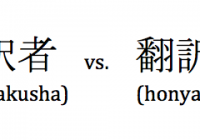What’s the difference between a 翻訳者 (‘honyakusha’) and 翻訳家 (‘honyakuka’)?
In recent years I’ve gradually transitioned from simply learning Japanese to becoming deeply interested in Japanese to English translation. Besides actually doing a lot of translations myself, I have been trying to understand how to talk about translation in Japanese, in particular understanding the nuances of various terms related to translation. As you may already… Read More »


